QuestionI have 1.5 year old JRT his name is Derks i have had him since he was 8 wks old. My question is when boys (especially my boyfriend right now and sometimes my brother) come around he pees and shakes and hides behind me. He is a very good dog he is house broken, sweet and cuddly dog. Also the other day i let them in when i got home and he did the same thing to me. I was just wondering if that is common in JRT?
AnswerHi Tayler,
Yes, some dogs (no matter what the breed) have what they call submissive urination. Here is some good information I found:
Believe it or not, this is not a housetraining problem. It has to do with some normal canine behavior patterns that you can and should deal with in a positive way.
Dogs are instinctively programmed to accept the authority of creatures (animal and human) that they consider to be superior to them. They seek the approval of their superiors and are eager to please them. Many dog owners prefer a dog who is submissive to people and eager to please, and selective breeding has produced many domestic dogs with this characteristic.
Some dogs are more submissive than others. Very submissive dogs, shy dogs that lack self-confidence and often young pups will urinate when in the presence of more dominant dogs and humans. It's their instinctive way of telling the superior "You are my Supreme Master. Your wish is my command. Please don't hurt me!"
Puppies usually outgrow this behavior as they mature. Dogs who are naturally shy, insecure, extremely submissive, or who have been abused may continue to exhibit submission in this way even as adults. It is generally an involuntary, subconscious reflex. The dog isn't deliberately trying to do it. As a matter of fact, he may not even be aware that he's doing it at the time!
Many dog owners mistakenly believe that this type of urination is a housetraining problem, and try to correct it with discipline. To their dismay and frustration, rather than improving, the dog's problem gets worse! Because the message he's sending is misunderstood by the owner, the dog is caught in a vicious cycle - his instincts tell him to urinate to please his superior by showing submission. But when he does, he is punished. He then tries harder to please by urinating even more. This results in more punishment, and still more urination. After a time, the dog may become so confused and insecure that he urinates at the mere sight of a human being or another dog.
If discipline won't solve the problem, what will? Your task is to take the excitement and stress out of the periods that previously triggered submissive urination. Get cooperation from all members of the family. When you first get home, you can anticipate that the dog will get excited and urinate so you need to minimize the excitement. Instead of an enthusiastic greeting to your dog, quietly walk in the door and go about your business. Let him outside to pee as usual, but without any fanfare. If you talk to him at all, just say "Hi Rover" in a calm, casual tone of voice. Don't make eye contact with him or pet him. After he settles down, very gently crouch down to his level presenting to him sideways (this makes you very non-threatening), then calmly and quietly praise him and tell him he's good. Be sure to tell your family and visitors to do the same.
Do everything you can to boost your dog's confidence. As he becomes more confident, he may feel less of a need to display extreme submissive behavior:
Positive reinforcement obedience training does wonders for a dog's confidence! An untrained dog is doesn't know how to communicate with humans or how to behave, but the trained dog understands what's expected of him, and the words you say to him. He's confident because he has the tools with which to please his superiors.
Socialization at training classes, dog daycare, at the park, or just going with you on errands and to visit friends can do wonders for your dog's confidence. Have guests over who are willing to help out with this problem.
Agility training is another wonderfully fun way to boost your dog's confidence using physical obstacles and mental stimulation as well as new human words to understand and obey.
Incorporate basic obedience (Sit, Stay, Fetch, Come, etc.) into your daily life and when your dog obeys, he gains confidence through your praise. Just don't overdo the praise (this can result in a puddle!). A simple "Good boy" and gentle pat is enough.
Minimize the occasions your dog makes you want to scold him; think about what your dog does that causes you to scold him. For example, does he get into the trash, steal your children's toys or chew on your sneakers? By simply putting a lid on the trash can or putting it into a closet and requiring your family to pick up after themselves, these situations can be eliminated. The easier you make it for your dog to do what you want, the quicker he'll learn and his confidence will grown. On the other hand, discipline, scolding and physical punishment will simply reduce his confidence and worsen your submissive urination problem.
Dogs, especially shy or submissive ones, are very sensitive to body language and tone of voice. Bending over a dog is a "dominant" posture that may provoke an accident. Instead, get down to your dog's level by crouching or kneeling, preferably at his side rather than head-on.
These dogs are often intimidated by direct eye contact as well. Look at your dog's face without looking directly into his eyes, and only for very short periods.
If you are expecting guests, take your dog for a walk and get his bladder emptied ahead of time, and restrict water consumption for an hour before your guests are to arrive.
When speaking to your dog, use a calm, confident, moderate tone of voice. Avoid very high or low extremes in pitch. Don't "coochy-coo" or babytalk to your dog either. These tones can create excitement that results in submissive urination.
Don't scold or punish your dog for urinating submissively. It will only make things worse. He can't be held responsible for something he doesn't understand or even know he's doing. Instead, use these methods to get to the root of the matter: His basic insecurity and lack of confidence. When he's made progress in these areas, submissive urination often disappears on its own. How long will it take? Every dog is different and it's impossible to say for sure. With most dogs, following our directions will show a noticeable difference within a short time. Solving the problem altogether depends on your hard work, patience, consistency and willingness to stick with it.
Good luck!

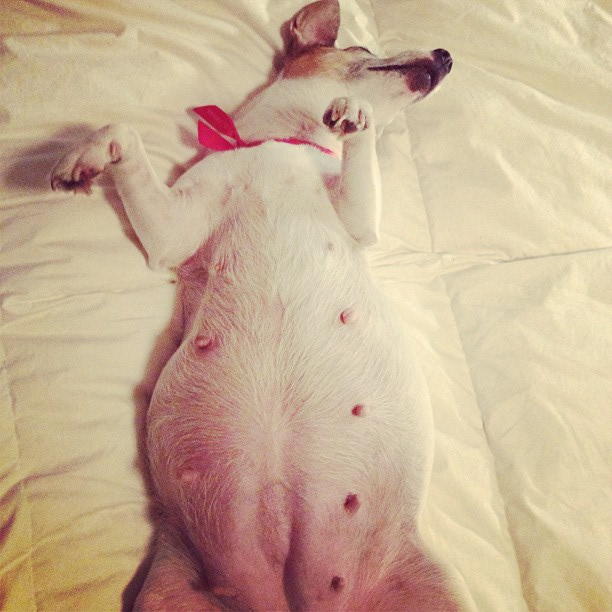 adopted a senior jrt who is pregnant??
Question
Sophie
Found you on google and was hopi
adopted a senior jrt who is pregnant??
Question
Sophie
Found you on google and was hopi
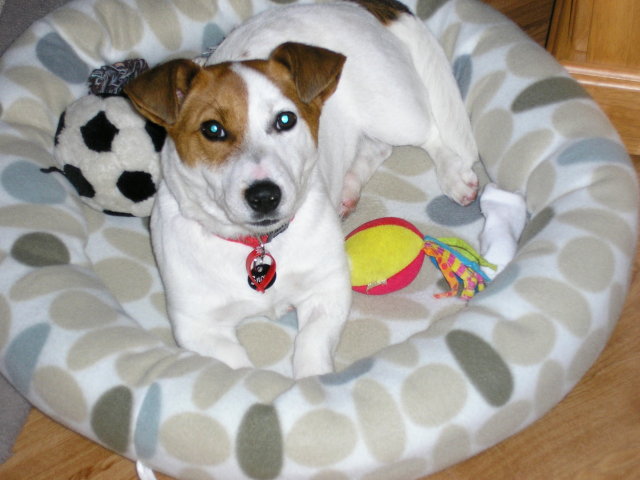 Jumping at the TV
QuestionQUESTION: Im sorry, you may have been asked thi
Jumping at the TV
QuestionQUESTION: Im sorry, you may have been asked thi
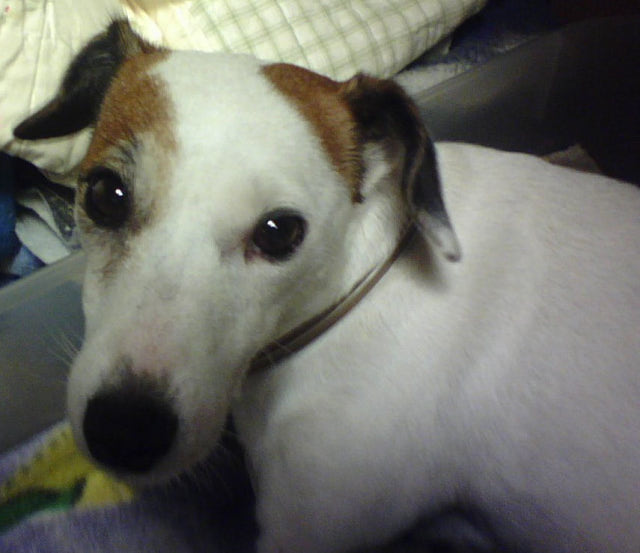 JRT heat cycle
QuestionQUESTION: Hello and thank you for taking the ti
JRT heat cycle
QuestionQUESTION: Hello and thank you for taking the ti
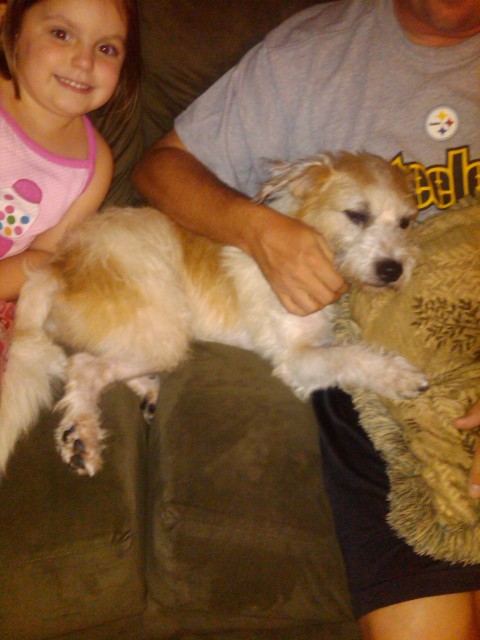 My Rescued Jack Mix
Question
Oliver
Hello Carol!
I am thrilled to see there
My Rescued Jack Mix
Question
Oliver
Hello Carol!
I am thrilled to see there
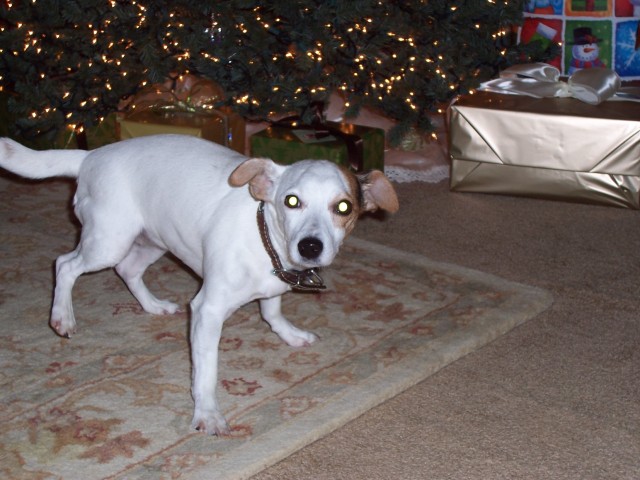 Jack Russell w/ Equiliberum problem
Question
Suzy Q
I have a 10 year old JR who has not bee
Jack Russell w/ Equiliberum problem
Question
Suzy Q
I have a 10 year old JR who has not bee